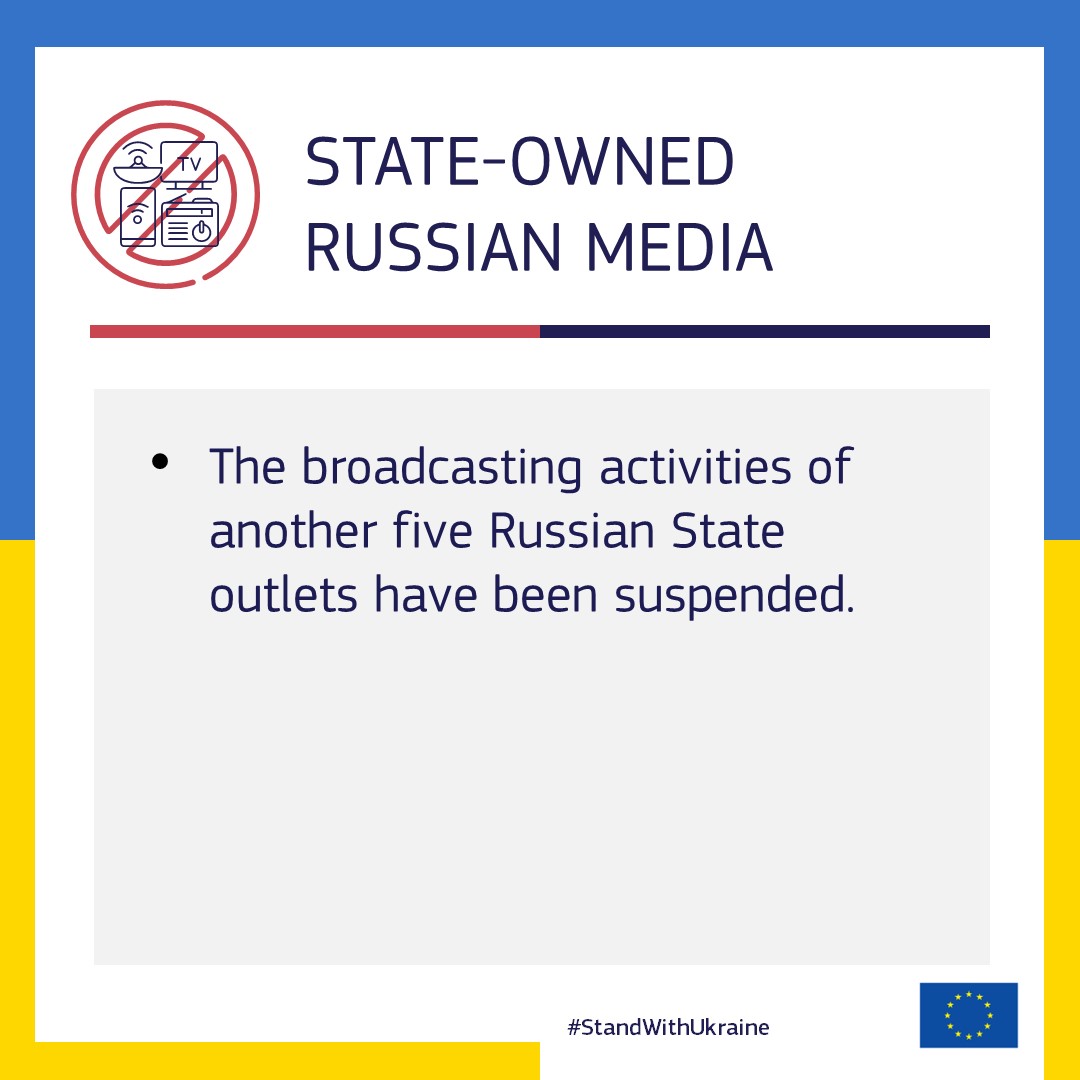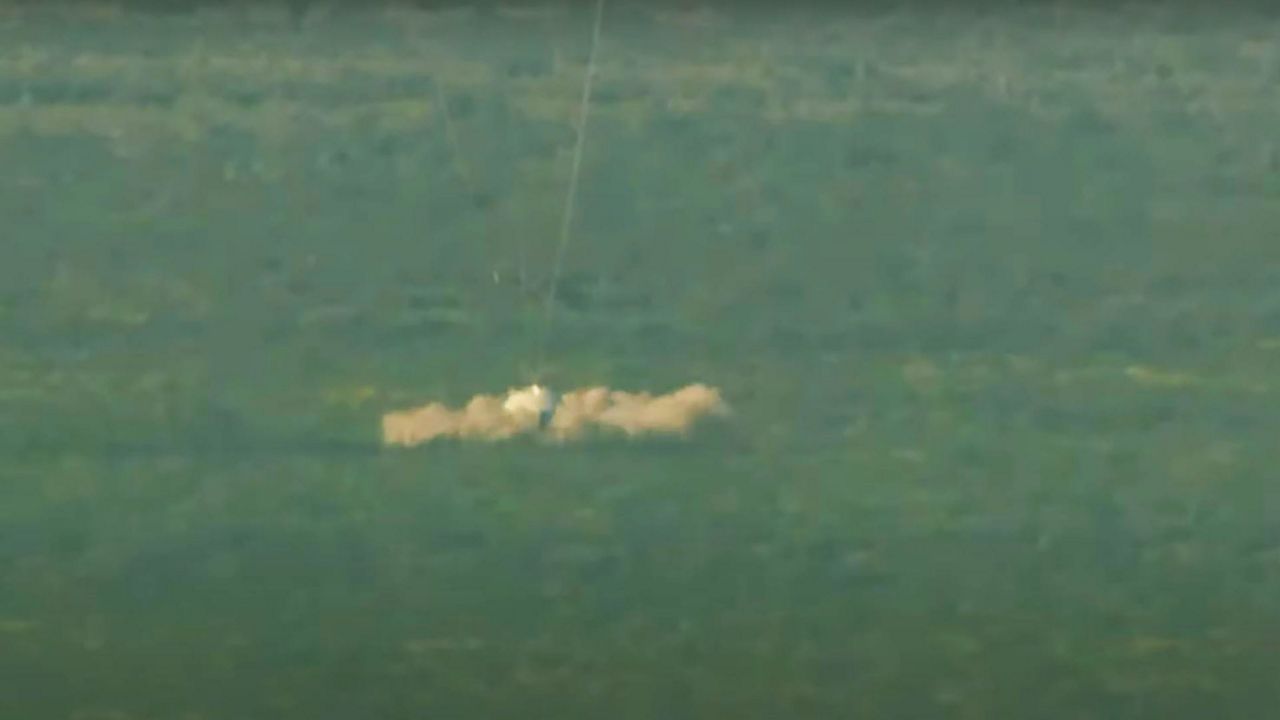Switzerland Joins EU In Latest Sanctions Targeting Russian Media Propaganda

Table of Contents
Details of the EU Sanctions Targeting Russian Media
The EU sanctions targeting Russian media aim to curb the spread of disinformation and propaganda related to the war in Ukraine. These sanctions are a direct response to the Kremlin's systematic use of state-controlled media outlets to manipulate public opinion both domestically and internationally.
Specific Media Outlets Sanctioned
The sanctions primarily affect key players in Russia's state-controlled media apparatus. This includes, but is not limited to, RT (Russia Today) and Sputnik, both notorious for their dissemination of pro-Kremlin narratives and blatant misinformation. Sanctions involve website blocking within the EU, restrictions on broadcasting, and asset freezes for individuals and entities associated with these outlets. Other outlets, including less prominent ones known for spreading specific disinformation narratives related to Ukraine, are also subject to sanctions.
The Rationale Behind the Sanctions
The EU's justification for targeting these media outlets centers on their documented role in disseminating disinformation and propaganda concerning the conflict in Ukraine. Evidence points to a coordinated campaign involving:
- Fabricated narratives: Creating false stories about Ukrainian atrocities and Nazi collaborators.
- Distorted information: Presenting a skewed and incomplete picture of the conflict.
- Propaganda campaigns: Promoting pro-Russian narratives and undermining the legitimacy of the Ukrainian government.
The sanctions are legally based on the EU's common foreign and security policy, aiming to protect the EU's security interests and address the threat posed by Russian disinformation. Sanctions imposed include financial restrictions, broadcasting bans within EU member states, and the freezing of assets belonging to individuals and entities involved in the propaganda machinery.
Switzerland's Historic Decision to Join the Sanctions
Switzerland's decision to join the EU sanctions represents a significant departure from its traditional policy of neutrality.
Switzerland's Traditional Neutrality
Switzerland has historically maintained a strict policy of neutrality, abstaining from military alliances and avoiding direct involvement in international conflicts. This neutrality has been a cornerstone of its foreign policy for centuries.
The Shift in Switzerland's Approach
Several factors contributed to Switzerland's decision to deviate from its traditional neutrality in this instance:
- International pressure: The international community, particularly the EU, put significant pressure on Switzerland to align with sanctions against Russia.
- Public opinion shift: Public opinion within Switzerland has increasingly tilted against Russia's actions in Ukraine, eroding support for maintaining complete neutrality in the face of blatant aggression and disinformation.
- Economic considerations: The potential economic repercussions of not aligning with the EU, Switzerland's most important trading partner, were also taken into account.
Key political figures within the Swiss government debated the ramifications extensively, ultimately concluding that joining the sanctions was the most responsible course of action.
Impact and Implications of the Sanctions on Information Flow
The impact of the sanctions on the flow of information is multifaceted and complex.
Effectiveness of the Sanctions
While the sanctions aim to restrict the reach of Russian propaganda within Switzerland and the EU, their effectiveness remains to be fully assessed. The sanctions primarily target mainstream outlets, but Russia has readily available alternative channels, including social media and less regulated online platforms.
Counter-measures by Russia
Russia has already responded by increasing its reliance on alternative media channels, including social media platforms, to spread its narratives. This underscores the need for continuous adaptation and innovation in combating disinformation.
Broader Implications for International Relations and the Information War
Switzerland's decision highlights the increasing importance of international cooperation in the fight against disinformation.
The Role of International Cooperation
The effectiveness of countering disinformation relies heavily on collaborative efforts between nations. Sharing intelligence, coordinating sanctions, and developing joint strategies are crucial to combating sophisticated propaganda campaigns.
Future Strategies in Combating Disinformation
Future strategies for tackling disinformation will likely involve:
- Enhanced international collaboration: Stronger partnerships between governments, international organizations, and technology companies to identify and address disinformation campaigns.
- Technological solutions: Developing advanced technologies to detect and flag disinformation more effectively.
- Media literacy initiatives: Educating the public to critically assess information and recognize disinformation tactics.
Conclusion: Switzerland's Role in Combating Russian Media Propaganda
Switzerland's unprecedented decision to join the EU in imposing sanctions on Russian media propaganda marks a significant development in the global fight against disinformation. The sanctions, while not a panacea, aim to curb the spread of pro-Kremlin narratives and contribute to a more balanced information landscape. The broader implications underscore the necessity of international cooperation and innovative strategies to combat the sophisticated techniques employed by state actors to spread misinformation. Stay informed about further developments regarding Swiss sanctions on Russian media propaganda and the broader international efforts to combat disinformation. Follow our updates for the latest news and analysis.

Featured Posts
-
 Royals Crush Brewers 11 1 In Home Opener
Apr 23, 2025
Royals Crush Brewers 11 1 In Home Opener
Apr 23, 2025 -
 Arizona Diamondbacks Secure Walk Off Win With Five Run Ninth
Apr 23, 2025
Arizona Diamondbacks Secure Walk Off Win With Five Run Ninth
Apr 23, 2025 -
 Guemueshane Okullar Tatil Mi 24 Subat Pazartesi Son Dakika Kar Tatil Bilgileri
Apr 23, 2025
Guemueshane Okullar Tatil Mi 24 Subat Pazartesi Son Dakika Kar Tatil Bilgileri
Apr 23, 2025 -
 Walk Off Bunt Brewers Defeat Royals In 11 Innings
Apr 23, 2025
Walk Off Bunt Brewers Defeat Royals In 11 Innings
Apr 23, 2025 -
 Blue Origin Scraps Rocket Launch Due To Subsystem Problem
Apr 23, 2025
Blue Origin Scraps Rocket Launch Due To Subsystem Problem
Apr 23, 2025
